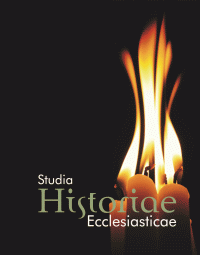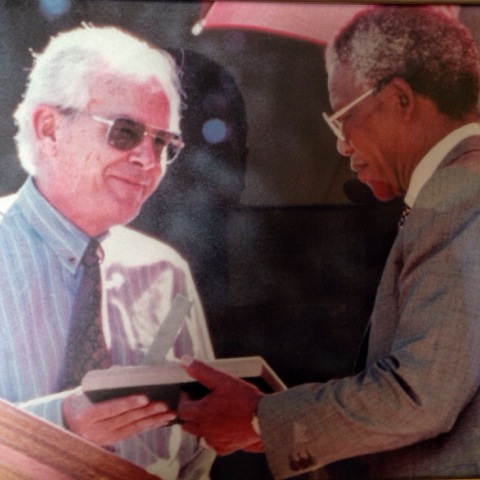Was Nelson Mandela a Christian? Was he a member of the Methodist Church of Southern Africa?
 Wednesday, September 10, 2014 at 6:48PM
Wednesday, September 10, 2014 at 6:48PM  In an earlier post I mentioned a research paper that I had worked on entitled "Mandela and the Methodists: Faith, fact or fallacy?" This paper was published at the beginning of this month in the academic journal Studia Historiae Ecclesiasticae (40th Anniversary special edition). You can find out more about the journal here.
In an earlier post I mentioned a research paper that I had worked on entitled "Mandela and the Methodists: Faith, fact or fallacy?" This paper was published at the beginning of this month in the academic journal Studia Historiae Ecclesiasticae (40th Anniversary special edition). You can find out more about the journal here.
The paper was originally delivered as the closing plenary address at the Theological Society of South Africa, and today I presented it at the International conference on Religion and Media at Faculdades EST in Brazil. I still am not at liberty to make the full text of the paper available. However, here are my slides from today's presentation.
So, was Nelson Mandela a Methodist? Indeed, he self-identified as a member of the Church, and my interviews with Bishops and ministers of the denomination confirmed that he was a loyal member of the Church. See this quote from Presiding Bishop Zipho Siwa:
Madiba remained a committed Methodist throughout his life. As a church, we hail the qualities that confirmed him as a true son of Methodism - a life of faith in God lived in service to others.
Bishop Zipho Siwa
Here are Mr Mandela's own thoughts on the matter (just one quote of many from his writings, speeches and letters that I found).
The values I was taught at these institutions have served me well throughout my life. These values were strengthened during our years of incarceration when this church cared for us. Not only did you send chaplains to encourage us, but you also assisted us materially within your means. You helped our families at a time when we could not help them ourselves… I cannot over-emphasise the role that the Methodist Church has played in my own life
Nelson Mandela
Was he a Christian? I would conclude that he was an African Christian Humanist. The paper describes the full detail of what that means. However, here are some reasons why I believe this to be true. The following list of descriptors of Christian Humanism come for John de Gruchy:
- Christian humanism is inclusive. “Being human” names our primary identity.
- Christian humanism affirms dignity and responsibility.
- Christian humanism is open to insight into our common human condition wherever it is to be found.
- Christian humanism claims that the love of God is inseparable from the love of others.
- Christian humanism heralds a justice that transcends material and sectional well-being.
- Christian humanism insists that goodness, truth, and beauty are inseparable.
Mr Mandela mentions in many speeches and his own writings (see for example his address to the Methodist conferences in 1994 and again in 1998, and of course his autobiography 'A long walk to freedom' (particularly the sections on his early life)) that he was deeply formed by two primary communities. First and most prominent was the African traditional (Xhosa) world view (which I cannot discuss in detail here). Second was the Christian faith and the institutions of the Christian Church. These shaped his identity in a profound way. There is little doubt that like all persons his faith identity shifted and changed at different stages in his life. Moreover, it would be dishonest to say that he was a Christian in the simple sense that this phrase is used in popular theology. But, he identified with the Christian faith and with the church.
The important point is to ask, of which “church” was Nelson Mandela a member?
We have already concluded that Nelson Mandela was a member of the MCSA (Methodist Church of Southern Africa). However, of which aspect or expression of church within the MCSA was he a member? The real question is what do we mean by the expression “church”? Dirkie Smit suggests (1) that there are three general forms of being “the church”. I shall briefly present these below.
The local congregation
For many Christians this is most likely to be their primary perspective of the church, a localised community of Christians, organised around regular common worship. Philander points out that this is the physical place, and social group, that people often think of when they answer the question of where they “go to church”, or what church they are members of. Certainly from what we have already established Nelson Mandela was a member of this form of church in his early life (up to 1958). However, we could not say that he remained a member of a local congregation in the years that followed that. As has already been suggested this would simply not have been possible, considering his imprisonment, and later public profile.
The institutional, denominational and ecumenical Church
Smit further points out that for many people the term “church” refers primarily to the organisational or institutional structures. When some people hear the word “church” they may think of the confessional community that they are a part of (e.g., Catholic, Orthodox or Methodist). Philander notes that often this expression of church is what people would point to in answer to the question “what does the church say about unemployment in South Africa”. It could also refer to collective groupings such as Evangelical Christians, or even more formal groupings such as ecumenical bodies (like the World Council of Churches, or the World Communion of Reformed Churches). From what was discussed above one could conclude that Nelson Mandela held his strongest link to this understanding of church – he was a member of a denomination. This type of understanding of the church is often the point at which members engage with issues of social concern and engage policy. Mandela certainly sought to identify with, and engage, the MCSA as a denomination (as was clearly shown in the 1994 and 1998 addresses he delivered to the Methodist Conference).
The church as believers, salt and light in the world
Smit points out that the third way in which people think of the church, is as individual believers who are salt and light in the world, each involved in living out their faith on a daily basis in their own particular ways. This is a very important way in which the church can participate in being an agent and bearer of hope in society. In reading Nelson Mandela’s speeches and writings one can credibly maintain that he saw himself as a person of faith who lived out his particular understanding of his task in the world in this manner. He often refers, as was shown above, to the fact that he “formed” for his work in early life (both through African culture and the ministry of the church).
Here are the references to the articles pointed to above:
1. Dirk Smit presented a more nuanced perspective on the Church sighting six variation forms, “gestaltes”, in Dirk J. Smit, “Oor Die Kerk as ’N Unieke Samelewingsverband,” Tydskrif Vir Geesteswetenskappe 2, no. 36 (1996): 119–29.
2. Dirk J. Smit, Essays in Public Theology: Collected Essays 1 (AFRICAN SUN MeDIA, 2007), 61–68.




 Today (10 May) marks the birth of one of the most remarkable and courageous Christian witnesses of our time -
Today (10 May) marks the birth of one of the most remarkable and courageous Christian witnesses of our time -  Today Dr Frank Chikane spoke at the
Today Dr Frank Chikane spoke at the 


